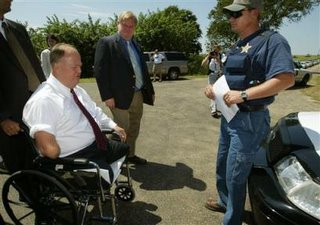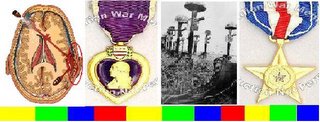Chickenhawk Flu Sweeps Thru President Bush's Not So Swift Boat
"He jests at scars that never felt the wound." -- Shakespeare  "We're the targets. We're uniting the enemu against us. And there's terrorism all over the world that there wasn't before we went into Irag," said Rep. John Murtah, D-Pa.
"We're the targets. We're uniting the enemu against us. And there's terrorism all over the world that there wasn't before we went into Irag," said Rep. John Murtah, D-Pa.
President Bush's August 1972 suspension from flight status in the Texas Air National Guard -- triggered by his failure to take a required annual flight physical -- should have prompted an investigation by his commander, a written acknowledgement by Bush, and perhaps a written report to senior Air Force officials, according to Air Force regulations in effect at the time.
In harsh personal terms, Murtha, who won a Bronze Star and two Purple Hearts in Vietnam, rebuked Bush and Vice President Dick Cheney for their aggressive new campaign to denounce war critics. Martha compared his own combat experience with Bush's service in the Texas Air National Guard and Cheney's draft avoidance during the Vietnam War.
"Our troops have become the primary target of the insurgency. They are united against U.S. forces and we have become a catalyst for violence. The war in Iraq is not going as advertised. It is a flawed policy wrapped in illusion," said Rep. John Murtha, D-Pa., a 37-year Marine veteran. If the mugging of Sen. Max Cleland of Georgia is a fair indicator of what is to come, the fall elections will be ugly. Cleland, a decorated veteran and triple amputee, was attacked by his Republican opponent, Rep. Saxby Chambliss, "for breaking his oath to protect and defend the Constitution."
If the mugging of Sen. Max Cleland of Georgia is a fair indicator of what is to come, the fall elections will be ugly. Cleland, a decorated veteran and triple amputee, was attacked by his Republican opponent, Rep. Saxby Chambliss, "for breaking his oath to protect and defend the Constitution."
"A disgrace," declared House Minority Leader Nancy Pelosi, D-Calif.
"I like guys who've never been there that criticize us who've been there. I like that. I like guys who got five deferments and neverbeen there and send people to war, and then don't like to hear suggestions about what needs to be done. I resent the fact, on Veterans Day, he (Bus) criticized Democrats for criticizing them," said Rep. Murtha. White House spokesman Scott McClellan, for the second day in a row, refused yesterday to answer questions about Bush's failure to take the physical and appeared to retreat from Bush's promise Sunday to make public all of his military records. Asked at a midday press briefing if all of Bush's records would be released, McClellan said, "We'd have to see if there is any new information in that."
White House spokesman Scott McClellan, for the second day in a row, refused yesterday to answer questions about Bush's failure to take the physical and appeared to retreat from Bush's promise Sunday to make public all of his military records. Asked at a midday press briefing if all of Bush's records would be released, McClellan said, "We'd have to see if there is any new information in that."
"The rankest of politics and the absence of any sense of shame," added Rep. Steny Hoyer of Maryland, the No. 2 House Democrat.
Throughout the country, patriotism, under Karl Rove's coaching, has become the sub-theme of the campaign. The message is sometimes coded, sometimes not. It is not the first time a campaign has turned into a brawl over custody of the flag: Remember the senior Bush's melodramatic 1988 trip to a flag factory?
"Before the war is ended, the war party assumes the divine right to denounce and silence all opposition to war as unpatriotic and cowardly," said Senator Robert M. La Follette. In interviews and written reminiscences, Kerry has described how his 50-foot patrol boat came under fire from the banks of the Bay Hap after a mine explosion disabled another U.S. patrol boat. According to Kerry and members of his crew, the firing continued as an injured Kerry leaned over the bow of his ship to rescue a Special Forces officer who was blown overboard in a second explosion.
In interviews and written reminiscences, Kerry has described how his 50-foot patrol boat came under fire from the banks of the Bay Hap after a mine explosion disabled another U.S. patrol boat. According to Kerry and members of his crew, the firing continued as an injured Kerry leaned over the bow of his ship to rescue a Special Forces officer who was blown overboard in a second explosion.
"We want to make sure that we support our troops that are fighting in Iraq and Afghanistan. We will not retreat," said Speaker Dennis Hastert, R-Ill. Two retired National Guard generals, in interviews yesterday, said they were surprised that Bush -- or any military pilot -- would forgo a required annual flight physical and take no apparent steps to rectify the problem and return to flying. "There is no excuse for that. Aviators just don't miss their flight physicals," said Major General Paul A. Weaver Jr., who retired in 2002 as the Pentagon's director of the Air National Guard, in an interview.
Two retired National Guard generals, in interviews yesterday, said they were surprised that Bush -- or any military pilot -- would forgo a required annual flight physical and take no apparent steps to rectify the problem and return to flying. "There is no excuse for that. Aviators just don't miss their flight physicals," said Major General Paul A. Weaver Jr., who retired in 2002 as the Pentagon's director of the Air National Guard, in an interview.
"[T]he essence of so-called war prosperity; it enriches some by what it takes from others. It is not rising wealth but a shifting of wealth and income," said Ludwig von Mises.
"You guys are pathetic! Pathetic!" yelled Rep. Marty Meehan, D-Mass. In Iowa, Democrat Tom Harkin is getting clubbed by opponent Greg Ganske, who went at him on the flag-burning amendment. Harkin's record as a Navy pilot during Vietnam was no help to him in Ganske's attack on him for voting against the amendment. Ganske, although he is running as "a compassionate doctor," made a tacky jest about Harkin's recent operation for a cancer on his lip.
In Iowa, Democrat Tom Harkin is getting clubbed by opponent Greg Ganske, who went at him on the flag-burning amendment. Harkin's record as a Navy pilot during Vietnam was no help to him in Ganske's attack on him for voting against the amendment. Ganske, although he is running as "a compassionate doctor," made a tacky jest about Harkin's recent operation for a cancer on his lip.
Democrats gave Murtha, a decorated Vietnam War veteran with close ties to the military, a standing ovation as he entered the chamber and took his customary corner seat. A Sept. 29, 1972, order sent to Bush by the National Guard Bureau, the defense department agency which oversees the Guard, noted that Bush had been verbally suspended from flying on Aug. 1. The written order made it official: "Reason for suspension: Failure to accomplish annual medical examination."
A Sept. 29, 1972, order sent to Bush by the National Guard Bureau, the defense department agency which oversees the Guard, noted that Bush had been verbally suspended from flying on Aug. 1. The written order made it official: "Reason for suspension: Failure to accomplish annual medical examination."
"It's a pathetic, partisan, political ploy," said Rep. Nita Lowey, D-N.Y. Added Rep. Ellen Tauscher, D-Calif.: "It's just heinous."
Asked if the same was true in 1992 when Bush's father criticized Governor Bill Clinton for not releasing his military records, stoking the controversy around Clinton's active avoidance of the Vietnam War draft by calling him "Slick Willie," McLellan replied, "I think that you expect the garbage can to be thrown at you in the 11th hour of a campaign, but not nine months before Election Day." "This is a personal attack on one of the best members, one of the most respected members of this House and it is outrageous," said Rep. Jim McGovern, D-Mass.
"This is a personal attack on one of the best members, one of the most respected members of this House and it is outrageous," said Rep. Jim McGovern, D-Mass.
Rep. Duncan Hunter, R-Calif., chairman of the House Armed Services Committee, however, "This is not an attack on an individual. This is a legitimate question."
Senator John McCain, R-Ariz., a former Navy pilot who was imprisoned and tortured in North Vietnam, pushed the Senate into a 90-9 vote banning inhumane and degrading treatment of detainees, over Cheney's strong objections. Joining McCain were Sen. Lindsey Graham, R-SC, a colonel in the Air Force Reserves and a miltary lawyer, and Sen. John Warner, R-Va., a Marine veteran and secretary of the Navy during the Vietnam War.
Questioning the president on anything -- on early knowledge of the attacks, exclusion of the FBI and CIA from the homeland security complex -- is considered risky business for Democrats. Said Sen. Bob Graham of Florida on "Face the Nation": "If the administration takes a stonewall position, and every word in their plan is biblical, and if you change it, you are unpatriotic."
"They've been itching for a fight for a long time," Rep. Marsha Blackburn, R-Tenn., said of the Democrats.
"It doesn't require any particular bravery to stand on the floor of the Senate and urge our boys in Vietnam to fight harder, and if this war mushrooms into a major conflict and a hundred thousand young Americans are killed, it won't be U.S. Senators who die. It will be American soldiers who are too young to qualify for the Senate," said George McGovern, "I'm fed up to the ears with old men dreaming up wars for young men to die in. " "Guard against the impostures of pretended patriotism," said George Washington.
"Guard against the impostures of pretended patriotism," said George Washington.
Murtha, discribing his weekly visit to Walter Reed Army Medical Center, said he visited one young man who had lost both hands and was left blind by friendly fire. "I was praising him, saying how proud we were of him and how much we appreciate his service to the country."Anything I can do for you?" His mother said, "Get him a Purple Heart.' I said, 'What do you mean, get him a Purple Heart?" Murtah recounted.
"War is the continuation of politics by other means," wrote Karl Von Clausewitz.
His mother said because her son was injured by friendly fire, the military had said he did not qualify for the honor. "I met with the commandant. I said, "If you don't give him a Purple Heart, I'll give him one of mine," Murtha said. "And they gave him a Purple Heart."
The terms "unnecessary suffering" and "superfluous injury" have not been formally defined within international law. In determining whether a weapon or projectile causes unnecessary suffering, a balancing test is applied between the force dictated by military necessity to achieve a legitimate objective vis-à-vis suffering that may be considered superfluous to achievement of that intended objective. The test is not easily applied. For this reason, the degree of "superfluous" injury must be clearly disproportionate to the intended objectives for development and employment of the weapon, that is, it must outweigh substantially the military necessity for the weapon system or projectile.
War would end if the dead could return.
War would end if the dead could return.
War would end if the dead could return.
War would end if the dead could return.
War would end if the dead could return.
~Stanley Baldwin
"Death has a tendency to encourage a depressing view of war." -- Donald Rumsfeld



























No comments:
Post a Comment